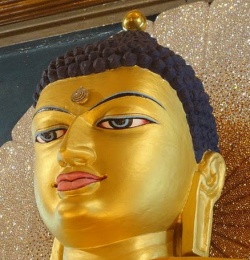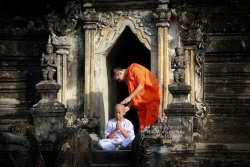First precept
The first precept of Buddhism -- do not kill -- touches on some of today's hotter issues, from veganism to abortion and euthanasia. Let's take a look at this precept and at what some Buddhist teachers have said about it.
First, about the precepts -- the Precepts of Buddhism are not the Buddhist Ten Commandments. They are more like training wheels. An enlightened being is said to always respond correctly to every situation. But for those of us who have not yet realized enlightenment, keeping the precepts is a training discipline that helps us live harmoniously with others while we learn to actualize the Buddha's teaching.
The First Precept in the Pali Canon
In Pali, the first precept is Panatipata veramani sikkhapadam samadiyami; "I undertake the training rule to abstain from taking life." According to Theravadin teacher Bikkhu Bodhi, the word pana refers to breathing, or any living being that has breath and consciousness. This includes people and all animal life, including insects, but not include plant life. The word atipata means "striking down." This refers to killing or destroying, but it can also mean injuring or torturing.
Theravada Buddhists say that a violation of the first precepts involves five factors. First, there is a living being. Second, there is the perception that the being is a living being. Third, there is the volition thought of killing. Fourth, the killing is carried out. Fifth, the being dies.
It is important to understand that the violation of the precept arises in the mind, with the recognition of a living being and the willful thought of killing that being. Also, ordering someone else to do the actual killing does not mitigate responsibility for it. Further, a killing that is premeditated is a graver offense than a killing that is impulsive, such as in self-defense.
The First Precept in the Mahayana Brahmajala Sutra
The Mahayana Brahmajala Sutra (Brahma Net) explains the first precept this way:
"A disciple of the Buddha shall not himself kill, encourage others to kill, kill by expedient means, praise killing, rejoice at witnessing killing, or kill through incantation or deviant mantras. He must not create the causes, conditions, methods, or karma of killing, and shall not intentionally kill any living creature.
"As a Buddha's disciple, he ought to nurture a mind of compassion and filial piety, always devising expedient means to rescue and protect all beings. If instead, he fails to restrain himself and kills sentient beings without mercy, he commits a major offense."
In his book Being Upright: Zen Meditation and the Bodhisattva Precepts, Zen teacher Reb Anderson translated this passage this way: "If a Buddha-child kills with his own hand, causes a person to be killed, helps to kill, kills with praise, derives joy from killing, or kills with a curse, these are the causes, conditions, ways, and acts of killing. Therefore, in no case should one take the life of a living being."
The First Precept in Buddhist Practice
Zen teacher Robert Aitken wrote in his book The Mind of Clover: Essays in Zen Buddhist Ethics, "There are many personal tests of this practice, from dealing with insects and mice to capital punishment."
Karma Lekshe Tsomo www.sandiego.edu, a professor of theology and a nun in the Tibetan Buddhist tradition, explains,
"There are no moral absolutes in Buddhism and it is recognized that ethical decision-making involves a complex nexus of causes and conditions. ... When making moral choices, individuals are advised to examine their motivation--whether aversion, attachment, ignorance, wisdom, or compassion--and to weigh the consequences of their actions in light of the Buddha's teachings."
Buddhism and War
Today there are more than 3,000 Buddhists serving in the U.S. armed forces, including some Buddhist chaplains. Buddhism does not demand absolute pacifism.
On the other hand, we should be skeptical that any war is "just." Robert Aitken wrote, "The collective ego of the nation-state is subject to the same poisons of greed, hatred and ignorance as the individual." Please see "War and Buddhism" for more discussion.
Buddhism and Vegetarianism
People often associate Buddhism with vegetarianism. Although most schools of Buddhism encourage vegetarianism, usually it is considered a personal choice, not a requirement.
It might surprise you to learn that the historical Buddha was not a strict vegetarian. The first monks obtained all their food by begging, and the Buddha taught his monks to eat whatever food they were given, including meat. However, if a monk knew an animal had been slaughtered specifically to feed monks, the meat was to be refused. See "Buddhism and Vegetarianism" for more on vegetarianism and the Buddha's teachings.
Buddhism and Abortion
Nearly always abortion is considered to be a violation of the precept. However, Buddhism also avoids rigid moral absolutes. A pro-choice position that enables women to make their own moral decisions is not inconsistent with Buddhism. For further explanation, see "Buddhism and Abortion."
Buddhism and Euthanasia
Generally, Buddhism does not support euthanasia. Reb Anderson said, "'Mercy killing' temporarily reduces a being's level of misery, but it might interfere with his or her spiritual evolution toward enlightenment. Such actions are not real compassion, but what I would call sentimental compassion. Even if a person asks us to help in her suicide, unless this would promote her spiritual development, it would not be appropriate for us to assist her. And who of us has the ability to see whether such an action would in fact be conducive to to a person's greatest welfare?"
What if the suffering being is an animal? Many of us have have been advised to euthanize a pet or have found a grievously injured, suffering animal. Should the animal be put "out of its misery"?
There is no hard-and-fast rule. I have heard a prominent Zen teacher say it is selfish not to euthanize a suffering animal out of personal squeamishness. I'm not sure all teachers would agree with that. Many teachers say they would consider euthanasia of an animal only if the animal is extremely distressed, and there is no way to save it or soothe its distress.




